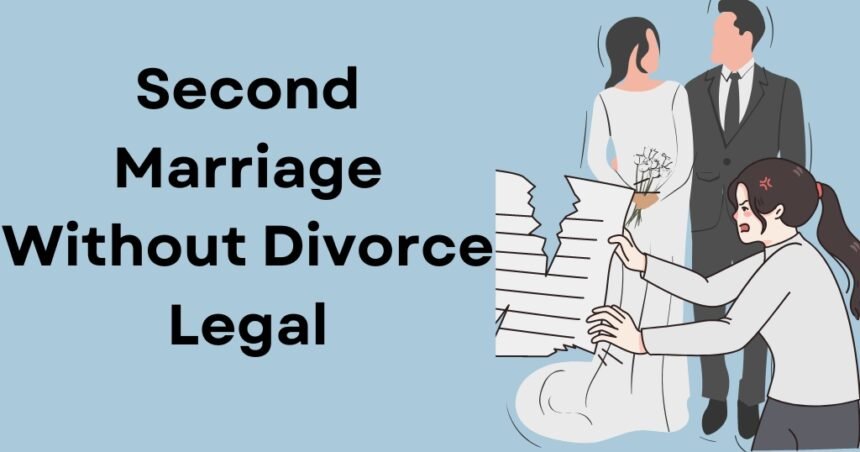Second marriages without the dissolution of the first marriage pose significant challenges, not just to the individuals directly involved but also to the societal norms and legal systems. This comprehensive blog explores the legal intricacies, potential punishments, societal impacts, and landmark judicial precedents surrounding such cases in India. By focusing on the relevant laws, legal remedies for affected parties, and real-world case studies, we aim to provide a clear understanding of this sensitive topic.
Understanding the Legal Framework
India’s legal system unequivocally condemns second marriages without divorce, terming them as bigamy under specific laws:
Indian Penal Code (IPC), Section 494: Bigamy
Section 494 of the IPC criminalizes bigamy and specifies:
“Whoever, having a husband or wife living, marries in any case in which such marriage is void by reason of its taking place during the life of such husband or wife, shall be punished with imprisonment of either description for a term which may extend to seven years, and shall also be liable to fine.”
This provision asserts that a second marriage, without legal dissolution of the first, is null and void, making the offender criminally liable.
Hindu Marriage Act, 1955
The Hindu Marriage Act governs the majority of Indian marriages. Under Section 5(i):
- At the time of marriage, neither party should have a living spouse.
- If this condition is violated, the second marriage is rendered null and void under Section 11.
Special Marriage Act, 1954
The Special Marriage Act, primarily for inter-religious unions, also mandates monogamy. Any second marriage conducted without first dissolving the existing one is deemed illegal and void under this law.
Legal Consequences and Punishments
The repercussions of entering into a second marriage without divorce are severe and multifaceted:
1. Criminal Liability
Under Section 494 IPC, offenders may face:
- Imprisonment: Up to 7 years, depending on case specifics.
- Fine: Determined by the court.
2. Nullification of the Second Marriage
The second marriage is considered legally void, meaning it holds no legal standing, as per the Hindu Marriage Act and the Special Marriage Act.
3. Civil Consequences
Offenders may face additional legal actions:
- Alimony and Maintenance: The first spouse can claim financial support under Section 125 CrPC.
- Child Custody Disputes: Courts often prioritize the child’s welfare, potentially favoring the first spouse.
- Property Disputes: The first spouse may assert claims over marital assets.
4. Social and Moral Repercussions
Offenders often face societal backlash, including:
- Loss of Reputation: Impacting personal and professional standing.
- Social Ostracism: From family and community.
Case Studies: Legal Precedents
Examining landmark cases provides deeper insights into how Indian courts handle such disputes:
Case Study 1: Usha Kiran v. Nirav Rani (2010)
In this case, the husband entered a second marriage while legally married to the first wife. Despite claims that it was a live-in relationship, evidence suggested otherwise.
- Court’s Decision:
- Declared the second marriage void under Section 11 of the Hindu Marriage Act.
- Found the husband guilty under Section 494 IPC.
- Granted the first wife divorce and awarded maintenance and child custody.
Case Study 2: Sarla Mudgal v. Union of India (1995)
This landmark case addressed religious conversion to Islam for circumventing bigamy laws. The court ruled that:
- Conversion for the sole purpose of second marriage does not protect the offender from Section 494 IPC prosecution.
- The first marriage must be legally dissolved, irrespective of religious conversion.
Legal Remedies for Affected Parties
If you are involved in such a situation, understanding your legal rights is crucial:
For the First Spouse
- Filing a Complaint: Lodge a criminal complaint under Section 494 IPC. Gather evidence such as marriage certificates, photographs, and witness statements.
- Divorce: Seek divorce on grounds like mental cruelty, desertion, or adultery.
- Maintenance: Claim financial support under Section 125 CrPC if dependent.
For the Second Spouse
- Annulment of Marriage: File for annulment citing the existing marriage of the partner.
- Legal Protection: Seek protection and compensation for harm caused by deception.
Social Implications
Bigamy also raises broader societal questions, such as:
- Moral Responsibility: The impact on family dynamics, especially children.
- Gender Disparity: Women are often disproportionately affected, highlighting the need for stronger protective mechanisms
—————————————
Second marriages without divorce are not just legal violations but also moral and ethical transgressions. Laws like the IPC Section 494, Hindu Marriage Act, and Special Marriage Act serve as safeguards against bigamy, ensuring justice for affected parties.
If you are caught in such a situation—either as the first or second spouse—consulting a qualified lawyer is imperative. Legal experts can guide you through the process, protect your rights, and ensure that justice prevails.
For more assistance or detailed legal guidance, connect with our legal experts today.








An excellent read that will keep readers – particularly me – coming back for more!